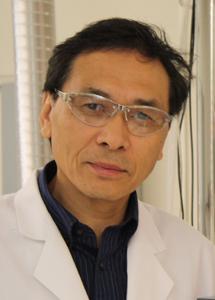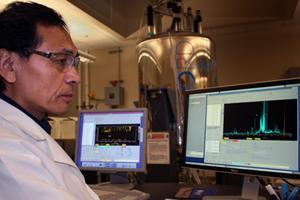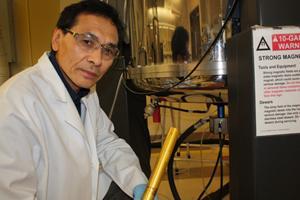Meet EPA Chemist Quincy Teng, Ph.D.

EPA research chemist Quincy Teng, Ph.D., focuses on the application of metabolomics—a relatively new, specialized field of biochemistry focused on studying small molecules known as metabolites—on environmental and life sciences. He has more than 25 years of experience in biological nuclear magnetic resonance (NMR) spectroscopy applied to structure biology, small molecules, and metabolomics.
Dr. Teng is the author of a textbook titled "Structural Biology: Practical NMR Applications" and is the author or coauthor of more than 60 peer-reviewed research papers. Prior to his current position at EPA, he was the director of the Chemical Sciences Magnetic Resonance Facility at the University of Georgia (1994 to 2006).
How does your science matter?
My research focuses on the application of metabolomics to assess the exposure and impacts of stressors such as chemical pollutants on fish species. Metabolomics is a relatively new field that uses analytical tools to identify changes in cellular metabolites, which are small molecules in organisms that have important biological functions related to growth, development, and reproduction. We look at how exposure to chemicals can affect these metabolites and if these exposures have a negative impact on the fish.
- Metabolomics Overview
- Metabolomics: Forensic tools as early indictors of wildlife exposure to chemicals
We're also developing and have applied cell-based metabolomics which uses cultured cells instead of fish for testing. We hope that cell-based metabolomics will give us the ability to screen chemicals in a more efficient and effective manner than traditional toxicity testing because using cells instead of an entire fish is faster and cheaper.

The research helps to protect sensitive organisms in our ecosystems. If a chemical exposure occurs, we can estimate the concentration and duration of the exposure and if it is harmful to our environment. This science informs policy makers so they can make the right decisions.
If you could have dinner with any scientist, past or present, who would you choose and what would you ask them?
I would choose Paul Dirac. He was an English physicist who made huge contributions to the field of quantum mechanics. He won the Nobel Prize in Physics at the age of 31 and is one of the youngest to ever do so.
I would ask him if he had any thoughts on simple ways to interpret biological data. Even though he wasn’t a biologist, I think he would have an interesting perspective.
Tell us about your background.
I received both my Bachelors degree in Chemistry and Masters degree in Physical Chemistry from Jilin University, which is located in my hometown in the northeast part of China. I received my Ph.D. in Biophysical Chemistry from Florida State University. I did my postdoctoral training at Cornell University Medical College in New York City and UC-Davis in California.

How did you get to EPA?
I was always interested in applying my knowledge to solve real-world problems. EPA had an opening in their laboratory in Athens, Georgia, where I was already living while working at the University of Georgia. I applied and got this position which I really enjoy.
When did you first know that you wanted to pursue science as a career?
I decided I wanted to be a scientist while I was in college. I really enjoyed the university atmosphere and thought doing research at a university would be a great way to continue to benefit from it.
What do you like most about your research?
I have worked in a lot of different places that have great scientists doing really great science. What I like most about EPA is the teamwork and the potential impact of our research. I work with many talented and dedicated scientists with different areas of expertise and whenever I have a problem, I know I can always find a colleague to help me.
If you were not a scientist, what would you be doing?
I think I would be a computer programmer. I started learning about computer programming in college and really enjoyed it. These days I still do hands-on programming for my own research.
Any advice for students considering a career in science?
To be a scientist, I think you really have to enjoy discovering new things. Researchers need to be passionate and hard-working. Sometimes research can be extremely hard but it’s always interesting. I think students should get experience in a research lab working on a project. There are many opportunities out there if you are interested!
Editor's Note: The opinions expressed herein are those of the researcher alone. EPA does not endorse the opinions or positions expressed.
